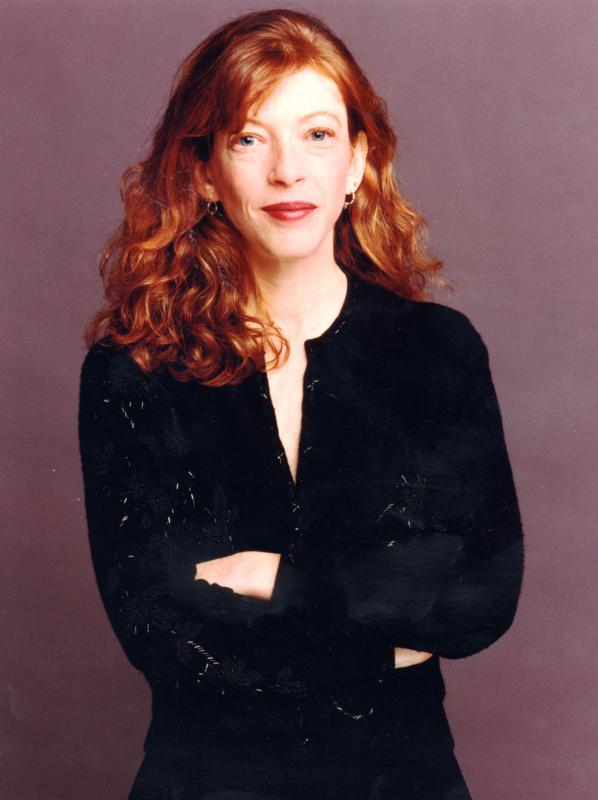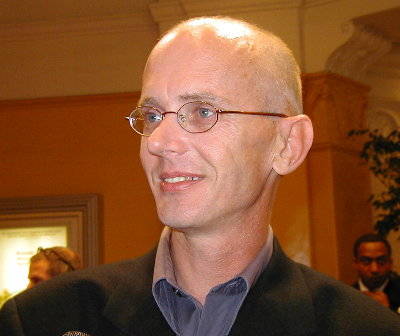Serendip is an independent site partnering with faculty at multiple colleges and universities around the world. Happy exploring!
Notes Towards Day 24 (Thurs, Apr. 12): Making "the" Movie



I. coursekeeping
for Tuesday, watch Adaptation
--and notice how this film differs from the one
you "made" for today (as well as how it departs
from the book....)
--Canaday owns a copy, which I have NOT put on reserve;
Magill also owns a copy, which IS on reserve
a week from tomorrow, by 8 p.m. on Fri,
Apr. 20, your third 4-pp. web event is due
(do what I will do: look over your first two,
and my responses, and try to build from there...)
a week after that will be our last class (!), Thurs, Apr. 26
when I will expect you to have formed small groups
to prepare 10? minute presentations reflecting on your
experiences over the semester. Presentations should encourage,
in a provocative and entertaining way, further story development
on the part of others in the class.
next Thursday (a week from today), I'll need you to tell
me what group you're in (so I can put together a playlist
and tell you how much time you'll have....)
II. a few post-Tuesday postings
ideas vspaeth wanted to get out before she forgot them...
& froggies315 on the joy obsessions and beliefs and facts
and everything we can't prove (which is everything?) --
plus material re: Isabel Allende's Tales of Passion....
III. making your movies:
create a storyboard for the first 5 shots
(or 5 important sequential shots...) of
"The Orchid Thief: The Movie"
(re-titlings also welcome!)
IV. this a way of re-focusing our discussion of the book
--the question of genre: an autobiography?
--the question of tonality: what is the narrative voice? do you trust it/her?
--the question of structure: what happens to Larouche 1/2-way-through?
V. Reading Notes, continued....
p. 29: "I didn't care all that much whether what he said
was true or not; I just found the flow irresistable."
p. 45: "no flower is more guarded against self-pollination
than orchids ....each orchid species has made itself irresistible"
p. 68: "The Victorians...set out to categorize the living diversity...
locating, identifying, and classifying....the Victorians looked for
order in the univese, an outline that could organize their knowledge...
and rationalize the meaning of existence"
p. 100: "as long as I have it, I still sort of have the moment when I got it"
p. 123: "Florida is... as suggestible as someone under hypnosis.
Its essential character can be repeatedly reimagined."
p. 127: "the place had a wierd overfull emptiness...it was full of the
feeling of a million things planned on and never done."
p. 136: "Laroche...had started to seem...like the endpoint in a continuum
....the oddball ultimate of those people who are enthralled by non-human
living things and who pursue them like lovers."
p. 145: [taking credit for a new hybrid that some one else created is] "conceptual
theft....For a Buddhist it would be spiritually incorrect to protest about intellectual
pirating..."
p. 169: "The pioneer-adventurers in south Florida were traveling inward, into a place
as dark and dense as steel wool, a place that already held an overabundance of living
things. The Florida pioneers had to confront what a dark, dense, overabundant place might
have hidden in it. To explore such a place you had to vanish into it....you might disappear."
p. 185: "Things disappear all the time in Florida, but they show up all the time, too.
Florida is powerfully attractive. It is less like a state than a sponge."
p. 201: "I felt that I was meeting people...who didn't at all seem part of this
modern world and this moment in time--because how they lived and what
they lived for was so optimistic. They sincerely loved something, trusted in the
perfectiblity of some living thing, lived for a myth about themselves and the
idea of adventure..believed that they could make their lives into whatever they dreamed."
p. 214: "Laroche believed all human beings... were afflicted with constricted and unsubtle minds...Laroche prided himself on possessing flawless logic and reason...poaching so that he could help the species in the long run....He trusted himself alone to balance out pros and cons, to disregard rules and use real judgment instead...other people had attitudes that were as narrow as ribbon and they had no common sense at all."
p. 226: "I'm going to do something that doesn't involve things that die...I can't stand working with things that die on you all the time."
p. 241: ..."making up stories about what the rain was trying to say."
p. 245: "he managed to find the fullness and satisfaction of life in narrow desires....I suppose that is exactly what I was doing in Florida, figuring out how people found order and contentment and a sense of purpose in the universe by fixing their sights on one single thing or one belief or one desire. Now I was also trying to understand how someone could end such intense desire without leaving a trace...Laroche's finishes were downright and absolute, and...he also shut off any chance of amends."
p. 246: "Look, the main thing is, the Internet is cool," he said."it's not going to die on me, ike some plant..."
pp. 249-250: "there were many times in Flordia when I felt I was in another world....nothing here seemed ordinary. The fruits were alien. Everyone and everthing had an exotic pedigree. Sometimes in Florida you feel that you are on the edge of the world, and that the rest of the world sloshes in as regularly as the tide...."
p. 251: "The marvelous plant world. We are but visitors in it."
"It doesn't have much connection to reality," he said. "But then again, what does?"
p. 252: "It was in the nature of Florida, this kind of abundance, the overrichness of living things--so many of everything that all of it blurs together and you have to decide whether to be part of the blur or to be a distinct and separate being."
pp. 255-256: "If I had ever doubted whether the orchid world was really as much a world, a culture, a family as I imagined it was, this antagonism was perfect proof. The orchid world had the intimacy of a family and the fights of a family...it was some kind of way to scratch out a balance between being an individual and being a part of somehting bigger than yourself....This has always been a puzzlement to me, how to have a community but remain individual....It is the fundamental contradictoriness of the United States of America--the illogical but optimistic notion that you can create a union of individuals ....I envied the orchid people....I envied the Semnole tribe....I even envied people like Laroche...who belonged to the cult of not belonging, which is its own small and crowded circle that gave them a shape for their lives, even if it was in bas-relief."
p. 258: "It was a relief to have no hope because then I had no fear; looking for something you want is a comfort in the clutter of the universe, but knowing you don't have to look means you can't be disappointed."
p. 260: "to win at a show...was a matter of shaping evolution, because plants that win in shows become popular, and other breeders will use them as parents for new hybrids and as a model for the kind of plants they willl try to produce on their own. Winner take all, including the future."
p. 266: "Well, I love computers now...It's really such a relief not having to rely on living things anymore."
p. 267: "Now why do you think a plant would look like this? That's how I'd always get caught up in this stuff. Botany by imagination. I'd put myself in the plant's point of view and try to figure them out. I'm a plant. Why do I want rough bark...? Why do I want narrow leaves...?"
p. 270: "time spent in a greenhouse had a rare, shapeless quality--a day could go by and they wouldn't even notice it had passed....Being in the shadehouse was restful...and it was vivid...and it was as fantastic as a a dream."
p. 273: "he was only an extreme, not an aberration--most people in some way or another do strive for something exceptional...rather than abide an ordinary life."
p. 276: "In the swamp you feel as if someone had plugged all of your senses into a light socket. A swamp is logy and slow-moving but at the same time highly overstimulating. Even in the dim, sultry places deep within it, it is easy to stay awake."
p. 281: "it was just as well that I never saw a ghost orchid, so that it could never disappoint me, and so it would remain forever something I wanted to see."
From a Conversation with Susan Orlean:
p. 287: "I was peeling an onion...I stumbled on an entire story of Florida land scams....I
loved the idea of taking a single event, something very specific and examining it thoroughly
and deeply...to take a very tight focus and make a book out of it."
"I think there is a discipline in taking true stories and making them
engaging to a reader. You have to deal with what really exists.
That is a greater challenge....this is reality."
p. 288: "John Larouche ...is only its object; Susan Orlean is its subject.
It is about you; it is a form of autobiography....your focus...living off the
desires, aspiraitons, happenings of others. That is how you make your
living. As a common parasite, really."
"We are put on earth, we don't know why and we need to figure out how
to make it feel meaningful, how to find some niche....People go to great
lengths to do this...my passion is to examine and interpret that and convey
it to other people....That's parasitic profiteering: making money off of
people's fantasies."
p. 290: "interesting, strange things happen in Florida. It is a bubbling-stew
of a place..the kinds of stories that interest me...starting new lives, creating
new communities, happened in Florida."
"I try to figure out if there is destiny and fate or if life is just haphazard.
What we search for is a kind of order and logic in what is the chaotic and
illogical experience of being alive. I think you grab on to little footholds that
make you think that there is logic and that there is some sense of order in your life
...I can't believe there isn't a grand design that is always unfolding in front of us...
Or, aren't we all inventions of our own choices and decisions?"
p. 292: "Because the relationship ends when the book ends, is that a betrayal?...
It is hard to imagine any relationship that is similar, except that of a confessor."


